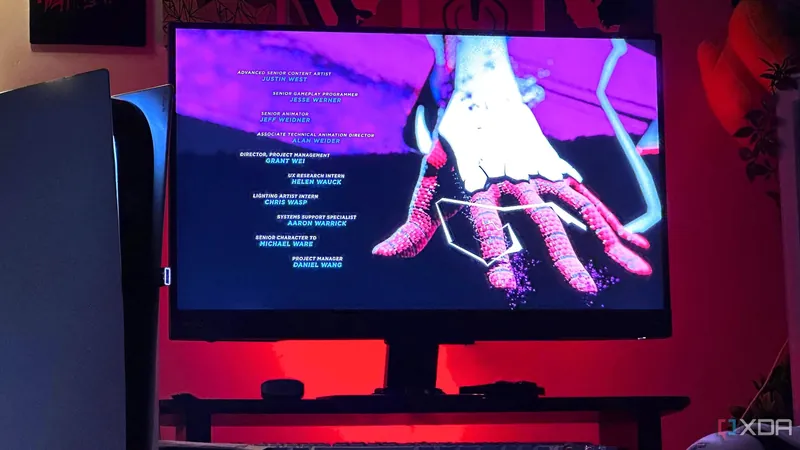
The Stark Realities of the Ninth Console Generation: Five Major Complaints
2025-04-06
Author: Li
The Stark Realities of the Ninth Console Generation: Five Major Complaints
The ninth generation of gaming, which officially commenced in November 2020, finds itself languishing in its fifth year, and quite frankly, it’s been underwhelming. With high expectations surrounding immersive gameplay, stunning graphics, and richer gaming experiences, the reality feels more like a series of missed opportunities and disappointment, prompting many to revisit their older gaming systems.
1. A Delayed Start to the Ninth Generation
While the PlayStation 5 and Xbox Series X were marketed as the leading consoles of this generation, their actual availability was hampered for nearly two years by a global semiconductor shortage. This meant that gamers often found themselves stuck with older hardware, and only a limited number of titles were developed specifically for the new consoles. Even with the release of some anticipated games like Spider-Man 2 and Alan Wake 2, many major titles continued to cross-release on eighth-gen platforms, diluting the excitement that comes with new hardware.
2. The Absence of Innovative New IPs
The trend of remakes and remasters has dominated this console generation, overshadowing the introduction of fresh, innovative intellectual properties. Developers seem more inclined to capitalize on nostalgia, with remakes of classics like Resident Evil 4 and The Last of Us overshadowing the release of new titles that could define this generation. Comparatively, previous generations like the PS4 saw the introduction of groundbreaking gaming experiences such as Bloodborne and Horizon Zero Dawn. This trend leads to a stagnant library, pushing gamers to question the relevance of their current consoles.
3. Skyrocketing Costs of Console Ownership
Another concerning trend is the skyrocketing costs associated with console ownership. The financial barrier to entry has never been higher, with initial purchases of over $500, controllers priced at around $75, and ongoing subscription costs like PlayStation Plus or Game Pass Core. Enthusiastic gamers are now looking at expenditures exceeding $1,000 just to enjoy online services. With affordable and high-performance PCs now available, many are starting to question whether the investment in consoles is truly worthwhile.
4. The Diminishing Appeal of Exclusives
When the PS5 was unveiled, the excitement was palpable. However, with the rapid advancements in PC technology and the arrival of budget-friendly yet powerful PCs capable of gaming at high specs, the appeal of console exclusives has diminished. The trend of releasing exclusives for PC is reshaping the industry, making it less enticing to invest in a console when the same experiences are becoming available on other platforms.
5. An Industry Under Pressure
Perhaps the most concerning issue this console generation has faced is the toll it has taken on developers. The gaming industry has seen severe layoffs, and many studios are shuttering their doors. With enormous budgets driving publishers to impose unrealistic sales expectations, studios grow risk-averse, limiting innovation to tried-and-true franchises. This stagnation stifles creativity and can lead to a more homogenized gaming culture.
What Lies Ahead for Gaming?
The excitement that typically accompanies a new console generation feels stunted. Gamers are left waiting — waiting for consoles to be available, for games that feel genuinely next-gen, and for the industry to stabilize. As discussions shift toward the next wave of hardware, questions arise about the purpose of this current console generation. Have we reached a plateau where the concept of revolutionary gaming systems has lost its charm, or can we still hope for something transformative in the future?
The reality is stark: while visually stunning games have emerged, it took far too long to get here. As we navigate through this console generation, it raises pertinent questions about the future of gaming and what we should expect moving forward. Until then, I guess it’s time to attack that ever-growing backlog from better times.




 Brasil (PT)
Brasil (PT)
 Canada (EN)
Canada (EN)
 Chile (ES)
Chile (ES)
 Česko (CS)
Česko (CS)
 대한민국 (KO)
대한민국 (KO)
 España (ES)
España (ES)
 France (FR)
France (FR)
 Hong Kong (EN)
Hong Kong (EN)
 Italia (IT)
Italia (IT)
 日本 (JA)
日本 (JA)
 Magyarország (HU)
Magyarország (HU)
 Norge (NO)
Norge (NO)
 Polska (PL)
Polska (PL)
 Schweiz (DE)
Schweiz (DE)
 Singapore (EN)
Singapore (EN)
 Sverige (SV)
Sverige (SV)
 Suomi (FI)
Suomi (FI)
 Türkiye (TR)
Türkiye (TR)
 الإمارات العربية المتحدة (AR)
الإمارات العربية المتحدة (AR)